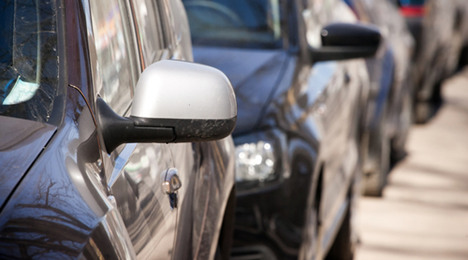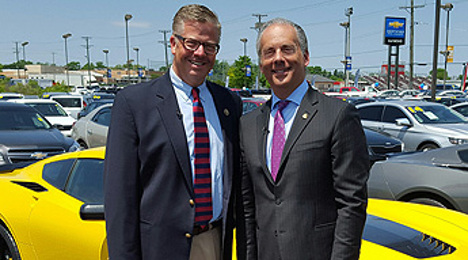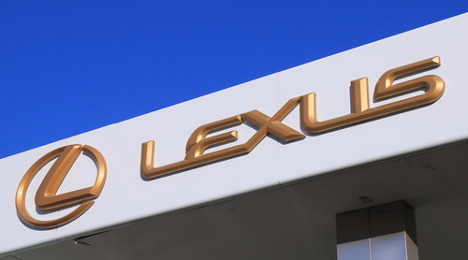On Tuesday, I watched live as Donald Trump, presumptive Republican nominee for president, gave a fiery speech laying out his trade agenda. He spoke at an aluminum plant in western Pennsylvania, where his colorful take on the international marketplace (“NAFTA was the worst trade deal in history”) was well-received.
Many aspects of Trump’s unconventional candidacy resonate with dealers — most notably his willingness to thumb his nose at establishment politics and politicians — but some elements are cause for concern. Trump is wrong on trade, and so is his opponent. As AIADA president Cody Lusk wrote in this week’s Automotive News, “The established punching bag of this election cycle isn't just the Washington establishment, it's also international trade.”
Trump and Hillary Clinton seem to be in some kind of bizarre contest to see who can distance themselves farthest from the international marketplace and trade agreements like the Trans-Pacific Partnership (TPP). Clinton, who supported TPP in her last job as Secretary of State, now seems to think she could negotiate a better deal. And Trump has promised that under his administration there will be no deal at all.
If Hillary is our rock on trade, Trump is our hard place. And dealers are stuck.
Fortunately, while dealers of international nameplate brands don’t have a presidential candidate supporting our businesses, we do have AIADA. Our association is working overtime to remind politicians and the public that trade has been good for America. Global trade has allowed international auto manufacturers to build 17 manufacturing plants and invest $73 billion in the U.S. It has allowed dealers to open 9,500 franchises and employ over 570,000 Americans with a payroll of $32 billion. It has even allowed manufacturers like Honda and Toyota to export 750,000 American-made cars and trucks to 140 different countries in 2015.
Oh, and NAFTA? The worst trade deal in history? In the four years after it entered into force the U.S. added nearly 800,000 manufacturing jobs.
For international nameplate dealers, trade HAS to be a pivotal issue when we cast our vote. Remember that the imported trucks and SUVs on our lots come with a 25 percent “chicken tax” thanks to a trade war with Europe 50 years ago. If it happened once, it can happen again. What if our next president starts another trade war? What kind of tax might we see on Japanese luxury cars? Or Korean SUVs?
Our presidential candidates are playing a dangerous game on the world stage, and our stores and employees could end up paying the price. While you consider how to vote this November, remember to also give your support to AIADA as we work to change the conversation on trade, and steer our candidates to safer, more prosperous shores.
Greg Kaminsky is the current chairman American International Automobile Dealers Association and a Toyota dealer in El Cajon, Calif.
Officials highlighted on Wednesday that CDK Used Lot Intelligence now will offer live auction capability for dealers as part of a new relationship with TradeRev, a mobile vehicle appraisal and auctioning system for dealers.
The companies explained the new integration can enable dealers to efficiently and effectively receive instant, live bids at the point of vehicle appraisal.
Additionally, dealers can have the ability to auction aged inventory from wherever they are from the palm of their hands.
“Dealers want the ability to have a seamless integration to a virtual auction platform during the appraisal,” said Scott Johnston, director of operations at CDK Global.
“The integration through CDK Used Lot Intelligence gives dealers the flexibility to launch auctions quickly, and start receiving bids within minutes,” Johnston continued. It also provides the dealers with the ability to quickly and profitably move a trade-in or lease return through to auction."
By bringing together two discrete workflows into an efficient process, CDK Used Lot Intelligence and TradeRev can provide buyers with easy access to bids through a custom bidding network established by the dealer or via the open network even before the retail deal is done. All post-sale auction services are provided through TradeRev’s partnership with ADESA, a business unit of KAR Auction Services.
“Since we launched in 2011, TradeRev has been changing the way dealers do business, and we are continuously innovating and looking for new and unique ways to improve our solution and better serve our customers," said Mark Endras, chief executive officer and founder of TradeRev.
“Integrating with CDK Used Lot Intelligence allows us to provide our customers with an even more powerful solution, and we look forward to unlocking new opportunities with this integration,” Endras went on to say.
CDK Global insisted it is the only DMS provider to offer this integration through its Used Lot Intelligence solution.
To learn more about the integration, visit go to www.cdkglobal.com/used-lot-intelligence.
Automotive marketing and advertising company Jumpstart Automotive Group released its latest shopper study on Monday, drilling deeper down into the behavior patterns of women and millennials as well as Asian and Hispanic shoppers.
While each of those demographics showed some unique characteristics, Libby Murad-Patel pinpointed what might be most important to dealerships on how to handle any customer who walks into the showroom or skims the store website with their computer or mobile device.
Murad-Patel, vice president of strategic insights and analytics for Jumpstart, explained that what’s generating so much shopper change is what she called the “accessibility of information.” She elaborated with Auto Remarketing after Jumpstart shared the study, which was completed in collaboration with Ipsos Connect and titled “Today’s Auto Shoppers: How They Research and Why Trust is So Essential in Winning Them Over.”
“Whether it’s literally doing a comparison of vehicles on your phone while you’re at the dealership or using social media to get recommendations and reviews, I think these are the big things that are changing the process,” Murad-Patel said. “Word of mouth has always been important. But the format that it’s in now has changed.
“Part of social media and its influence, they’ve made the consideration window an ongoing thing,” she continued. “We talk in this study about how people are always passively shopping. They’re always collecting information. That’s a little bit of a change. People who are in market are already coming in with a pretty good idea about the vehicles that are top of mind or a few brands that are top of mind. That’s because they’re constantly gathering. We’ve always seen other cars on the road.
“Now that we’re also seeing them in social media, we talk to a lot more people, either verbally or through a computer screen or mobile device, and we’re sharing a lot more information. Ultimately that’s building that constant consideration set. That’s helping to make that shopping window to be a little bit shorter because we’re already coming into market with what we’re considering.”
Jumpstart found that consumers are constantly cycling in and out of market depending on their changing life situations and preferences. Shoppers, especially millennials, no longer spend four months in the vehicle-purchasing process, which Murad-Patel pegged as short as 30 days — a timeframe that likely would delight any dealership.
To be exact, the study indicated 74 percent of millennials now take four weeks or less when shopping for a vehicle, and 88 percent research online throughout the entire process.
“That was pretty critical in terms of that segment. That research window was much shorter than we anticipated,” Murad-Patel said.
Jumpstart indicated that women continue to be an important audience for automakers and dealers, particularly since they influence 80 percent of all transactions. The study mentioned that women rely heavily on independent research and reviews and are more likely to consult Consumer Reports than any other group. Women place a greater value on practical needs such as passenger seating, comfort and safety, while remaining budget conscious. Although they are primarily new-model buyers, they show more willingness than men to consider used if it means they’re going to get more for their money.
“If they were able to get more of the bells and whistles on top of their needs at a better price point with perhaps a warranty, then used was still a consideration,” Murad-Patel said.
Jumpstart determined Asian and Hispanic shoppers place a greater emphasis on brands or vehicles that are more popular or recognizable, as well as vehicles with alternative fuel options. The study showed overall purchase price is important to Asian shoppers, but they show more willingness to increase their monthly payment if they feel the value is there. Hispanic shoppers rank purchase price higher than monthly payment, but monthly payment is a higher consideration for them than any other group.
The firm highlighted that Asian consumers have a higher affinity for luxury vehicles due to a “you get what you pay for” mentality and cultural influences that place a big emphasis on quality. Hispanic shoppers tend to purchase more new vehicles than used, and they often hold onto a vehicle and pass it down to a family member instead of trading it in, making trade-in offers less relevant to this group.
No matter the age, gender or ethnicity, Murad-Patel shared with Auto Remarketing about what Jumpstart expected and what the study showed.
“Anticipations going into (the study) were largely that a little more broadly we would find a lot more bigger differences in how people shop,” she said. “In reality, their methods are all very similar. The differences were really found in either the technology they used or relied heavily upon during the time period in which they shopped.”
Quality & reliability now more important than fuel economy
Throughout the research, Jumpstart indicated quality and reliability were of higher importance than fuel economy. Analysts contend this trend might stem from a recall-heavy environment today combined with low gas prices over the last few years.
When consumers begin their research, Jumpstart found that their top three must-haves in a brand or vehicle are: good value (77 percent), a reputation for being strong and reliable (68 percent) and a reputation for excellent quality (65 percent).
But ultimately when it comes time to buy, quality and reliability (34 percent), gas mileage (29 percent) and price point (28 percent) are the top three key influencers for all shoppers.
“The results of this study illustrate that people are similar in the way that they gather information. But there are both subtle and significant differences between demographics,” Murad-Patel said.
“Our hope is that brands across the entire automotive spectrum use these insights to help elevate the shopping experience for all consumers.”
About the study
The research was conducted by Ipsos Connect from December through March. Through qualitative research (online diaries, focus groups, and one-on-one interviews in Houston and Sacramento, Calif.), then quantifying — with measurable data — those findings through a series of national online surveys, Jumpstart stressed that this study provides a look at general trends and addresses some of the fundamental differences among these key demographics.
For the survey, 1,014 U.S. respondents were interviewed online, all of whom met the following three criteria:
—Adults ages 18 to 64
—At least $30,000 in annual household income
—Purchased a vehicle in the past year or intended to purchase a vehicle in the next six months.
Jumpstart explained the precision of online polls is measured using a credibility interval. In this case, the survey has a credibility interval of plus or minus 3.5 percentage points.
According to Stephen Kraus, chief insights officer for Ipsos Connect and director of the study, “This study paints a vivid portrait of today’s auto shopper: informed, empowered, value-oriented and brand-focused. The research also underscores the crucial importance of the Internet, as 80 percent research online throughout the purchase process, not just as the purchase becomes imminent.”
To download the complete study, go to this website.
While franchised dealers surely want to turn plenty of used and new metal this summer, the National Automobile Dealers Association suggested that they welcome another kind of “up” who might be equally as important as the potential buyer for a vehicle that’s been in inventory for too long.
NADA emphasized the upcoming congressional recesses this summer provide an “ideal” opportunity for dealers to meet with their members of Congress to discuss the association’s legislative priorities. The congressional recess schedule for the House and Senate is now through July 5 and again from July 18 to September 6.
“Meetings with members of Congress at home — either at their district offices or at the dealership — go a long way toward supporting NADA’s legislative efforts on Capitol Hill,” association officials said.
Specifically, NADA recommended that dealers should ask their Democratic Senators to support and vote for S. 2663, the Reforming CFPB Indirect Auto Financing Guidance Act, which would require the Consumer Financial Protection Bureau to withdraw the “flawed” guidance that attempts to eliminate the ability of dealers to discount auto financing for consumers.
For the NADA Issue Brief and Myths vs. Facts sheet on S. 2663, go to this website.
For assistance in setting up a meeting with your member of Congress, go here for NADA’s grassroots brochure titled “3 Easy Steps.”
For additional support in arranging a visit at a congressional district office or the dealership, contact Patrick Calpin, NADA director of grassroots advocacy, at (202) 547-5500 or [email protected].
Tom Folliard didn’t mince words.
“The first quarter of FY17 was a challenging one for us,” the CarMax chief executive officer said during a conference call Tuesday discussing the company’s first quarter earnings report.
Total revenues increased by 2.8 percent, he said, while used unit comps were slightly positive — up 0.2 percent — and total used units grew 4 percent. Comp units were driven by an improvement in conversion, Folliard said, which offset a modest decrease in store traffic.
Folliard said he believed that decline in traffic is both “predominantly and disproportionately a result in decrease of Tier 3 sales.” (Tier 3 consumers are those who credit score falls between 620 and 659.)
Chief financial officer Tom Reedy noted a continuing downward trend in applications by consumers at the lower end of the credit spectrum. He said that Tier 3 financing as a percent of sales declined to 11.9 percent compared to the first quarter of last year, which he attributed this to lower applicant volume and credit tightening by third-party vendors.
President Bill Nash noted that as a percentage of sales mix this quarter, vehicles zero to 4 years old remained essentially flat compared to last year at approximately 77 percent. Midsize and large SUVs and trucks as a percentage of sales increased by more than 2 percent to approximately 25 percent in this first quarter compared to last year’s first quarter and remained flat compared to the fourth quarter.
Nash said two stores were opened during the first quarter, in Springfield, Ill., and in San Francisco. Subsequent to the end of the quarter, CarMax opened a store in El Paso, Texas.
He said the company plans to open an additional 13 stores in FY17. Two of those will be in the second quarter: one in Bristol, Tenn., a new market for CarMax, and one in Boston, which will be the company’s third store in that area.
Nash highlighted that the company unveiled a new website in April.
“It combines an upgraded and enhanced design with a seamless experience across all devices. We have also upgraded the entire site to a state-of-the-art technology platform,” he said. “This will allow us to more quickly innovate, test new capabilities and personalize the experience based on the customer’s individual preferences.”
CarMax is also testing an online financing protocol in 10 of its stores.
“We’ll have sales consultants involved in the process,” Nash said. “We’ll contact a customer of they are declined.”
A call participant asked if CarMax foresees a time when store count might not be growing as much, but the company is reaching more customers online.
“We think that to be successful you need to have a really good presence in both,” Folliard said.
“Consumers are being much more informed before they come into the store. So they are doing a lot of research up front. We know nine out of 10 of our consumers who buy from us do some homework ahead of time on carmax.com,” he continued. “We are going to be focused both on traffic, both in-store traffic to the web and then equally focused on conversion.”
Another participant asked if CarMax feels the need to add Tier 3 finance companies given that Tier 3 activity is down.
Another call participant asked whether CarMax sees a need to add financing options or take on additional originations in the Tier 3 space.
“As far as looking at our Tier 3 lenders, we will do that from time to time. We test lenders when it makes sense,” Folliard said.
“As far as Tier 3, I would characterize it as steady as she goes.”
A vast majority of consumers said they would not buy another vehicle from a dealership after their data had been compromised, according to a recent survey given to both dealers and buyers.
The second annual dealership survey by Total Dealer Compliance also showed that fewer than a third of dealers employ a network engineer with computer security certifications/training.
“As car dealerships continue to be a real target for cybercriminals, with fewer data-protection measures in place than most other industries, we set out to discover the effect this is having on a car dealership’s bottom line,” Max Zanan, president of TDC, said in a news release. “Our report discovered that more than 70 percent of dealers are not up to date on their anti-virus software, and nearly a third of consumers lack confidence that their personal data is secure when purchasing a vehicle.”
Highlights from the survey given to dealers include:
— Nearly 85 percent have a contract with a 3rd party vendor to handle more complex IT work.
— Only 30 percent of dealers employ a network engineer with computer security certifications/training.
— Only 25 percent hired a third party vendor to try to hack into their networks to test their vulnerability.
— More than 80 percent employ an IT engineer to handle basic day-to-day work.
— More than 70 percent of dealers are not up to date on their anti-virus software.
Highlights from the consumer survey include:
— Nearly 33 percent of consumers are not confident in the security of their personal and financial data when making a purchase at a dealership
— Just under 84 percent of consumers will not go back to buy another vehicle from a dealership after their data has been compromised
TDC recommends that dealerships should regularly conduct IT vulnerability scans, Windows security checks, provide online courses on networking, as well as implement a solid computer security policy. TDC conducts vulnerability scans by using independent “White Hat” hackers to discover a dealership’s cyber vulnerabilities and based on those vulnerabilities discovered, create policy.
“Car dealerships need to put procedures in place to help prevent cybersecurity attacks. We help dealers focus on social engineering and how not to fall victim to hacking,” Zanan said. “As ever, our report turns a spotlight on the hot topic of data security, revealing the necessity of having strict policies and procedures in place that are being adhered to by all employees to ensure consumer confidence and loyalty.”
It was a clean sweep for Lexus in the NADA Dealer Attitude Survey.
In the winter version of the semiannual survey that gauges franchised dealer sentiment of franchise value, Lexus earned the No. 1 spot in all three categories:
- Overall ranking
- Consideration of dealer input on product, product quality concerns and advertising
- Dealer response to the survey
Lexus is going on three consecutive years (so, six straight surveys) of earning the No. 1 overall spot. For the past six years, Lexus has not fallen out of the top five overall, NADA said.
“Facilitating open, honest and productive discussions between auto manufacturers and their franchised dealers is one of the most important functions of NADA,” NADA president Peter Welch said in a news release.
“Our members rely on the dealer attitude survey to present a comprehensive assessment of dealer sentiment to their manufacturers, and the automakers rely on it as a vital tool for improving their business practices,” he said.
Complete rankings are as follows:
Overall Rankings
1. Lexus
2. Toyota
3. Subaru
4. Honda
5. Porsche
6. Ford
7. Mercedes-Benz
8. Kia
9. Jeep
10. Audi
Listens Well to Dealers
1. Lexus
2. Toyota
3. Subaru
4. Honda
5. Ford, Kia (tie)
7. Hyundai, Lincoln, Mercedes-Benz, Porsche
Dealer Response Rate
1. Lexus (89% of dealers completed survey)
2. Mercedes-Benz (85%)
3. Hyundai, Porsche (tied at 81%)
5. Toyota (76%)
6. Ford, Audi (tied at 73%)
8. Lincoln (68%)
9. Fiat, Jaguar (tied at 66%)
In the news release, Welch lauded all brands earning top 10 scores in any of the categories.
“Brands that rank in the Top 10 among their peers in the marketplace are clearly doing something right, and they deserve recognition for it,” Welch said.
As wholesale prices for compact vehicles continued to soften, Black Book representatives in the lanes last week noticed a significant amount of dealers sat on their floor-plan wallets stemming from the frequency of units that rolled over the block without the hammer finalizing a sale.
According to the latest Black Book Market Insights report, the place where auction observers spotted no-sales happening more often a week ago occurred in Florida as one representative said, “There were quite a few no-sales today with an overall soft market.”
Another member of the Black Book team stationed in the Sunshine State mentioned, “Sellers didn’t get what they wanted for trucks today. There were many no-sales but some dropped their floor to make the sale.”
Meanwhile down in Texas, the lane watchers indicated, “Attendance and consignment were both low today but what sold brought really good money.”
And in Illinois, Black Book reported, “Buyers felt as though prices were higher somewhat this week compared to last.”
Soft conditions were noticed in Tennessee, too: “The market trend in this location was a bit slow today but clean full-size trucks are still in strong demand.”
Trucks also were keeping ringmen busy in Washington as a Black Book representative said, “Strong market at this location with 4WD trucks in demand.”
With demand for trucks still in place, Black Book editors noticed after reviewing their volume-weighted data that overall truck values decreased by 0.30 percent last week. The average depreciation rate in truck segments was 0.15 percent during the previous eight weeks.
As far as cars, overall volume-weighted car values decreased by 0.47 percent last week. Black Book pointed out this movement is worse than the average depreciation rate of 0.27 percent seen in the previous four weeks.
What triggered that overall decline a week ago were prices for subcompact cars and midsize cars experiencing a significantly higher drop in value of 0.87 percent and 0.79 percent, respectively.
Last week’s data also indicated compact van, subcompact crossover and minivan segments sustained the largest decreases at 1.59 percent, 0.79 percent and 0.65 percent, respectively.
Furthermore, three of those segments showed the greatest single-month valuation drop: subcompact cars (down 2.4 percent), compact vans (down 2.2 percent) and compact cars (down 1.6 percent).
“Subcompact cars saw the largest drop in values last month and they continue to experience downward pressure as demand is weak and supplies remain abundant,” said Anil Goyal, Black Book’s senior vice president of automotive valuation and analytics.
It’s already a record-setting 2016 NIADA Convention and Expo, and the National Independent Automobile Dealers Association is just getting its week of meetings, training, networking and other festivities started.
The 70th anniversary convention opened on Monday at its new venue — the recently renovated Mirage Hotel and Casino in Las Vegas — having already surpassed the record for most registered attendees, breaking the previous record by 19 percent.
That previous record was set at the 2006 Convention and Expo at the Las Vegas Hilton.
That record number is expected to grow with on-site registrations to solidify the event’s place as the largest in its 70-year history.
NIADA highlighted that convention attendance had already been trending upward as last year marked the third consecutive increase, an 8 percent rise above the 2014 event. The 2016 convention attendance received an extra boost from the addition of the BHPH World Convention, one of the assets acquired by NIADA from Leedom and Associates in December.
That convention has been folded into the NIADA Convention and Expo, significantly expanding its buy-here, pay-here and subprime auto finance training.
As a result, the 2016 NIADA Convention and Expo offers more dealer education sessions on more topics than ever before, including an extensive BHPH component led by NIADA national director of 20 Groups Chuck Bonanno.
Bonanno is a 13-year veteran of the Leedom operation who joined NIADA to grow the newly acquired educational assets, which also include 20 Groups, boot camps, dealership consulting and BHPH Dealer magazine.
The association also mentioned this year's event also boasts the largest expo hall ever with more than 170 exhibitors in a space some 10,000 square feet larger than last year’s Expo at Caesars Palace.
As always, the 2016 NIADA Convention and Expo features the insight of NIADA director of dealer development Joe Lescota and compliance sessions led by NIADA senior vice president of legal and government affairs Shaun Petersen, as well as industry knowledge and ideas from some of the industry’s best and brightest, including TrueCar chief executive officer Chip Perry, Autotrader’s Howard Polirer, Equifax’s Angelica Jeffreys, AutoZone's Ray Curry, NABD president Ken Shilson, Cox Automotive chief economist Tom Webb and more.
In addition, the convention includes social events, networking opportunities and events to honor the used vehicle industry’s best — the National Leadership Awards Banquet on Wednesday night and the National Quality Dealer Award ceremony Thursday night.
DealerSocket is gearing up for the upcoming National Independent Automobile Dealers Association Convention and Expo with a half dozen new product releases and enhancements through the end of the year.
Dealers attending the event that runs from Monday through Thursday in Las Vegas can drop by Booth No. 1301 to see full demos of the following technology, all tailored to the unique needs of independent dealers:
• Mobile CRM application: Can enable dealers to increase the amount of data collected by an average of 30 percent or more, translating to more sales. The app includes a VIN scanner that pushes trade information to third-party appraisal sites, a driver’s license scanner, and SocketTalk texting functionality.
• DealerFire websites and digital marketing: Can multiply dealer return on investment by as much as 10 times through responsive websites, tailored content marketing, search engine marketing, and more. The latest enhancement includes a way to identify web visitors in real time who are already contacts in DealerSocket CRM, then target them with tailored marketing communication based on their online behavior.
• Mobile desking: Can display detailed comparisons of multiple retail options to maximize profitability — all with the improved customer experience and increased efficiency of a mobile app. Dealers can see an average 30 percent increase in first pencil close rates when providing customers with more payment options.
• iDMS: Designed to combine the best aspects of FEX DMS and AutoStar Solutions, along with a host of new features including a mobile-optimized interface, multitasking navigation, the ability to decision all deals within the platform, real-time QuickBooks integration, payment stacking, and more.
• Inventory+ True Score: Can recommend inventory purchases based on a dealership’s historical data, including customer and lender requirements. This appraisal tool helps dealers make the best purchase and offer decisions for their particular store, not just the broader market.
• Revenue Radar: Can help dealers uncover more leads from their own database, precisely when each customer is ready to buy and before he or she shops the competition. This data mining solution leverages used-to-used car pings and reverse inventory matching to close more sales.
After NIADA, DealerSocket will demo its suite of revolutionary independent-dealer-focused tools at several state conferences including the Texas Independent Automobile Dealers Association Convention on July 24-26 in San Antonio.
The company’s tour schedule will culminate at DealerSocket User Summit, also in San Antonio, on Oct. 3-5. A central location was chosen to provide greater access to the thousands of DealerSocket clients across the United States and Canada to learn, network and share best practices.
The company is offering special early-bird pricing to those who register now for User Summit.
For more details and to review DealerSocket’s new releases, visit NIADA Booth No. 1301, call (866) 813-1429 or visit DealerSocket.com/NIADA.












